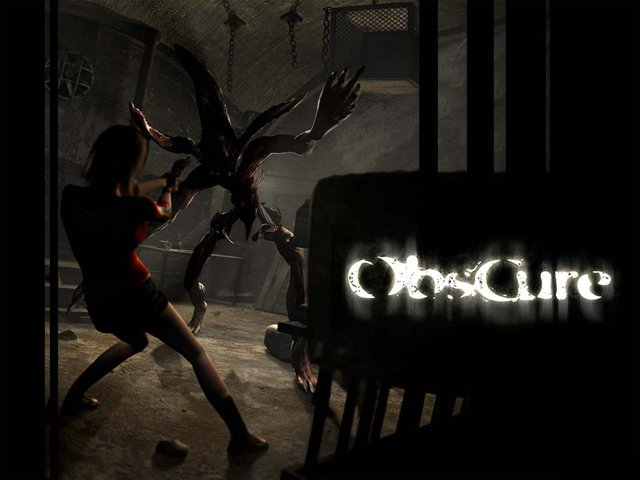
Note: All images in this article are sourced from the game's website kit, which I downloaded well over ten years ago, and is no longer available online that I can find. Thus, I am unable to properly "source" these materials. I'm making this clear up front: they're not mine, I didn't create them, they were released by the publisher and intended for use when creating fan sites, reviews, or other online publications.
Obscure (or Mortfilia as it was known in Europe) is not the best survival horror game in the world. Then again, since this was French developer Hydravision's first completed project, and released as a $20 budget title instead of the standard $50 price tag a game of this era typically commanded, you wouldn't expect it to be.
That said, despite its limited budget and freshman dev team, Obscure manages to do a ton of things right, and offers up a lot of fresh takes to the genre while paying homage to 90's teen horror films, especially The Faculty. These people poured their hearts into this game, and it definitely shows. So here's why Obscure is one of the most fun survival horror games you've probably never played.

The story of Obscure is really the story of five students who attend Leafmore High, and the terrible events to which they bear witness over the course of two days in Autumn.
It all starts so innocently, with best friends Kenny and Stan playing a pickup game of hoops with a couple other students after school, while Shannon observes from the bleachers, and Josh records with his movie camera. If you're playing the PS2 version, you'll hear the song "Still Waiting" by SUM 41 playing during this sequence, but the song wasn't licensed for the Xbox or PC versions -- boo!
After the game, Stan and the other two players hit the showers while Shannon chats with Kenny, who we learn is her brother. Kenny's been distant lately, and plans to be even moreso tonight: with their parents out of town, he's planning to spend the night at his girlfriend Ashley's house. Over Shannon's objections, Kenny sticks around after everyone else calls it a night to shoot a few more baskets.
Once he's done proving he's the biggest terror on the court, he heads to the locker room, where his cell phone's ringing off the hook. It's Ashley, wanting to know if he's still planning on making their date. While Kenny assures her that he'll be there soon, a shadowy figure sneaks in and swipes Kenny's bag. After hanging up with Ashley, Kenny discovers somebody swiped his stuff and heads off to catch the thief.
The perpetrator leads Kenny on a chase through the gymnasium, across the parking lot, and through a gate leading to an area of the school property which is usually off-limits: a garden-like zone with a boarded-up house and an open door leading to the cellar. With no place else for the thief to have gone except down, Kenny descends the stairs and finds himself in a gloomy basement where he soon discovers a battery-powered flashlight, a loaded handgun, a roll of duct tape, and a metal ladder descending into darkness.
Kenny tapes the flashlight to the pistol (something Space Marines will still be struggling with a hundred years in the future) and climbs down the ladder, which leads to a long, dark corridor with bizarre plant growth lining the walls and hideous noises off in the distance. As he explores the sub-basement, he sees strange surgical equipment, massive cages, and other stuff that has no business being anywhere near a normal high school. Stuffed in a back corner room, he finds Dan.
Dan's a teenager, just like Kenny, only he's rail-thin, completely bald with sunken eyes, dressed in clothes that look too big for his frame, and half-crazed with fear, babbling that Kenny "fell for it too". What exactly Kenny fell for is unclear, as Dan claims there's no time to explain, they just need to get the hell out of there, a sentiment with which Kenny is happy to agree.
On the way back, a previously locked door bursts open, and a nightmarish abomination which looks like it might have once been a person, surrounded by a strange, swirling darkness, stomps into the room. Finding their weapons completely useless against it, the pair make a run for it. Kenny makes it to the next hallway, but poor Dan isn't so lucky. Grabbed from behind, he emits an agonized scream as the mutant literally bites off his head. Kenny pours on the speed down the hallway, which is now filling with small, gibbering mutations that snap at his legs, and makes it to the ladder, only to look up and cry out in horror as someone seals the doorway above him, leaving him locked in the darkness with the abominations.
Cut to the next day, where school is starting and Ashley is pissed. When Shannon asks if something happened during her date with Kenny, Ashley snaps that Kenny never arrived: he stood her up, and she intends to give him both barrels when she sees him. Now Shannon's worried though: Kenny didn't come home last night. If he wasn't with Ashley, where the hell was he? Meeting up with Josh, they ask if he's seen Kenny since the basketball game, but Josh spent most of the night editing his video footage. He opines that something may have happened to Kenny after they left him in the gym, and suggests they stay after school to have a look around, and also ask Stan if he's seen Kenny.
Thus, after the final bell rings, Josh, Shannon, and Ashley find themselves hiding out in a small study room, plotting where they want to search, when Mr. Garrison, the school custodian, unknowingly locks them in. What starts as a simple quest to get out of the locked room without landing themselves in trouble soon turns into a moon-lit journey through the hellish history of Leafmore High, where there's something scarier than the principal and nastier than the lunches served in the cafeteria running around unchecked.
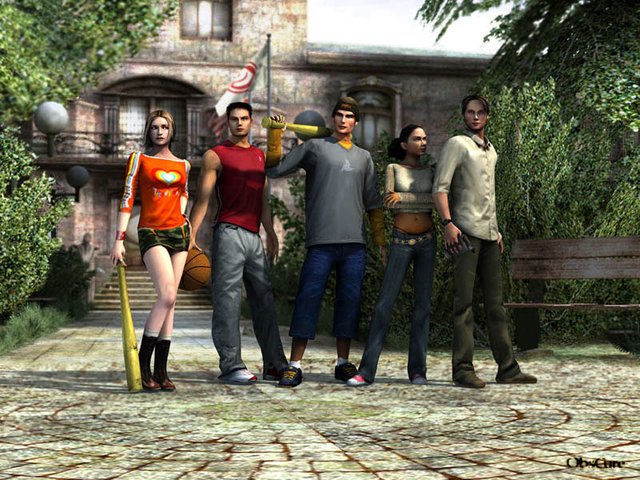
What instantly makes Obscure unique in its presentation is the fact that two players can explore the school simultaneously. Unlike Resident Evil, Silent Hill, and Fatal Frame, the kids patrol in pairs, so you always have someone to cover your back, or team up to take down a larger adversary. The second player can drop in and out at any time, and even when you're playing by yourself, you can swap between characters with the tap of a button. What's better, your AI teammate is competent enough not to shoot you in the back, and you can issue simple commands (Stay Here, Follow Me, Help Me Out) using the D-pad. Thus, co-operative play actually feels co-operative, as opposed to feeling like a prolonged escort mission. While you initially start out with three kids when the game begins, you'll be able to find and recruit Stan and maybe even Kenny (depending on how you handled the Prologue) as the story continues. When not active, the other kids hang out in 'hub' area, where you can return at almost any time and swap your controlled character, your partner, or any weapons or other gear you've found. The individual kids also serve as a "lives" system of a sort, since if one dies while exploring the school, the game goes on as long as there's at least one left alive to continue the search.
But these kids aren't the interchangeable sort, and you'll want to keep each of them alive for as long as possible because each one has a special skill or talent that makes them unique and useful under different circumstances:
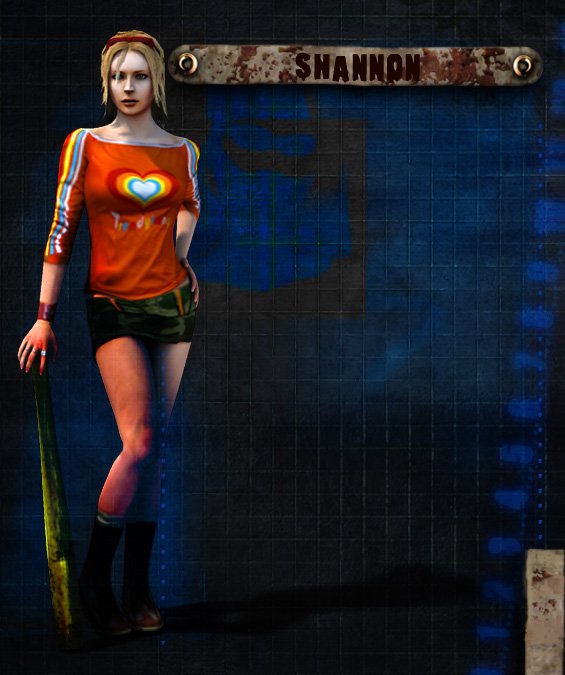
Shannon, despite her carefully cultivated attitude and style of dress, is extremely intelligent. She's adept at solving puzzles and figuring out what to do next in any given situation, so if she's with you, she can point you in the right direction with a quick hint to keep the story flowing forward, suggest a possible use for an item you picked up, or other similar action. In addition to being the game's built-in hint mode, Shannon also knows the basics of First Aid. Every kid can heal him/herself or a friend with a First Aid Kit, but Shannon heals an extra 25% health when she uses one.
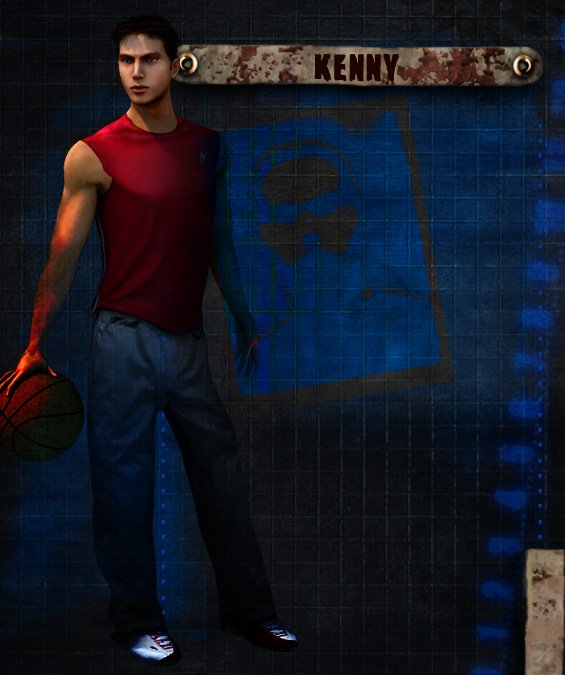
As you can probably guess from his attire, Kenny's quite the jock. Not as brainy as his sister, Kenny's more at home on the basketball court than in the classroom, but for once, this might actually pay off. Kenny's stamina is head and shoulders above everyone else's, which gives him more health than any of the other students, and the ability to sprint for short distances, allowing him to pour on the speed when some monstrosity is breathing down his neck.
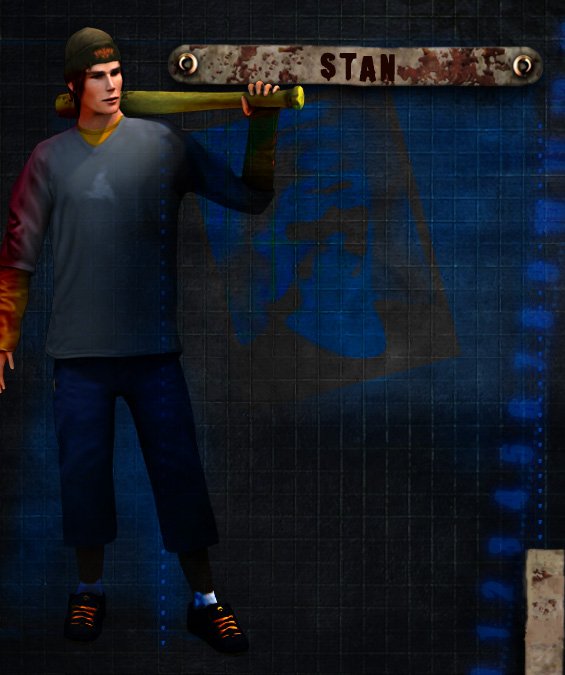
Stan's what you'd get if Josh Hartnett and Eminem had a son. A slacker with a devil-may-care attitude, Stan's the kind of person who could be just about anything if he applied himself, but he's currently content to goof off and coast through life, occasionally hacking into the school's computers to ensure barely-passing grades. A stint in the local jail put Stan close to some major-league criminals, and he knows how to break into places other people think they've secured. With Stan around, you can easily identify if there are any locked objects in the vicinity. And, while any kid can use the spool of wire item to jimmy open a door with enough time and fiddling, Stan can pop doors, lockers, and supply closets faster than it took you to read this sentence.
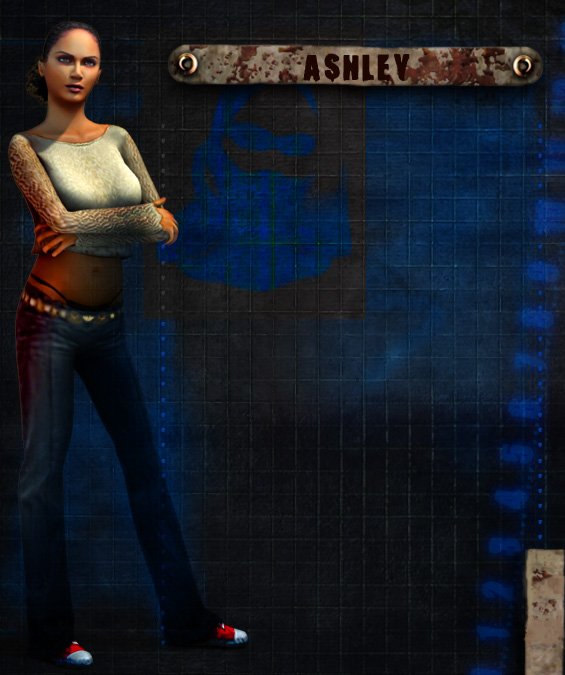
She might look like a fashion model crossed with an angry cheerleader, but Ashley's a tomboy through and through no matter what that exposed thong and low-riding jeans might make you think. Having grown up with a father who takes the safety of his daughter seriously, Ashley knows how to defend herself using anything from sticks and knives to pistols and shotguns. Because of this, Ashley knows when and where to strike for maximum impact, and she deals the most damage with melee weapons. Her firearms training also allows her to 'double-tap' with a gun, shooting twice in succession without having to re-aim in between like the other kids.
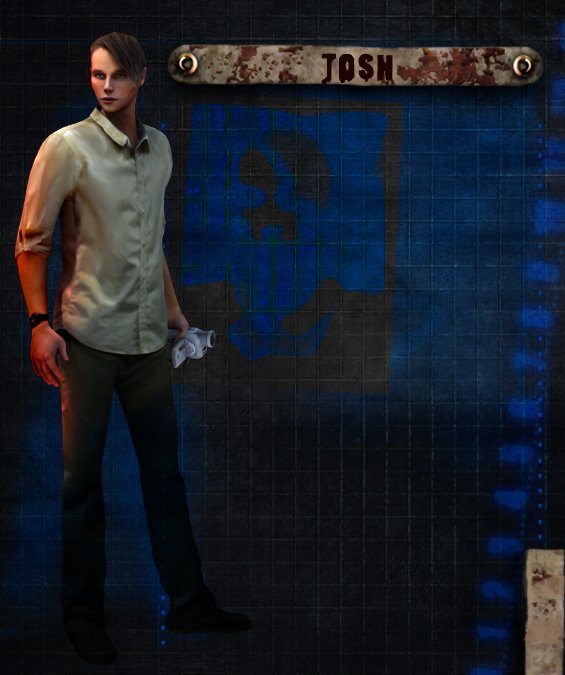
And then there's Josh. While he's a reasonably serious student, Josh has always fancied himself a journalist, and as such has gotten very good at ferreting out things other people don't want him to find. Out of the five, he's the most observant: while collectibles and other objects will glow when any character gets within close proximity, with Josh in your party the pickups will glimmer no matter where you are in the room. Additionally, Josh can tell you if there are any items or objects left to interact with in a given room with the press of a button, making him your go-to guy if you want to make sure you grab every health item, weapon, ammo pickup, save disc, map, and file in the game.
This multi-character, swap-on-the-fly system means that no two games of Obscure need play exactly the same, and it allows the player(s) to tailor the experience to their own desires. Folks who enjoy combat-heavy play will be drawn to Ashley and Kenny, while people who want to make sure they grab everything that isn't nailed down will gravitate towards Josh and Stan, and players who don't like solving puzzles or getting stuck for long periods of time on one thing will enjoy having Shannon and Josh team up.
What's nice is that while the death of any kid is a setback, it doesn't make it impossible to finish the game -- it just makes it a bit harder. Losing Ashley, for instance, means it will probably take longer to kill a boss monster, while losing Stan means you're going to be spending longer looking for locked things and forcing them open. Obviously the ideal solution is to never let anyone die (and, indeed, all five kids need to survive to the end if you want the best ending), but it's a great design choice that Hydravision implemented, and very different from most other games of the sort where if your character becomes zombie chow your only choice is to re-load your most recent save.
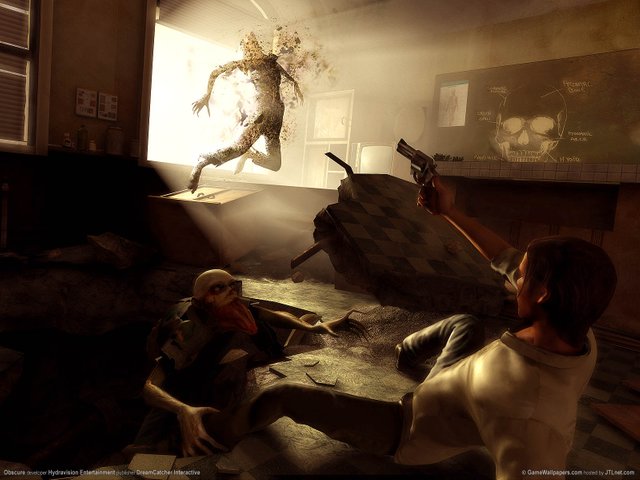
But Obscure's most interesting aspect is the way light factors into the gameplay. Early on, you discover that light severely weakens or even outright destroys the creatures you're battling on the school grounds. At first, you can use this to your advantage by breaking open windows to create pools of sunlight that will instantly reduce an enemy to ash. But as the game proceeds, it gets later in the evening, and finally the sun goes down. This leaves you with only the flashlights you've managed to find to light the way.
As noted above, the kids can easily tape lights to guns, but the flashlights also have a 'boost' function, which allows them to shine more brightly for a few seconds. Boosting your lights is necessary to dissolve the shadow barriers which surround most enemies. You can kill the various creatures while they are protected by the shadows, but it takes a lot more ammo or melee weapon blows to do so, so boosting your lights is an important aspect of the game. But those boosts only last for so long before the kids have to let the light cool down again, so there's an element of strategy involved: do both players boost their lights to quickly take down a single adversary, or should one player boost while the other one doesn't to ensure a longer duration of extra light is available? It's an interesting, well-implemented mechanic. It's not always used in conjunction with monsters either: the prologue/tutorial part of the game with Kenny shows that you can also boost to clear away dark shadows from around doors or other places so you can proceed.
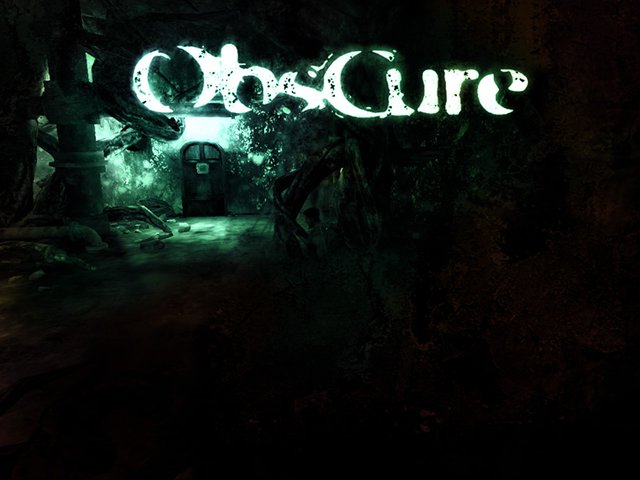
The level design is exceptional as well. Leafmore High feels like a real place, and the fact it was built in the early 1900's means its run-down appearance looks suitably appropriate. Everything from the library and the cafeteria to the classrooms and the auditorium feel lived-in and long-suffering, which just adds to the menace. When the lights go out, a part of a building collapses, or some other mishap occurs during the story, it never seems tacked on or thrown in just for the hell of it.
The hub system the game uses is nice as well, and it's designed to allow your kids to return to the meet-up point quickly. In fact, many times you don't even need to backtrack if you don't want to: a quick trip to the map screen and a couple button presses puts everyone back at the current meeting place so you can trade characters or equipment, or just save some time avoiding places you've already been through once or twice already.
The game opens up new parts of the school as the story continues: sometimes via access to a new tool like a pair of bolt cutters which let you cut through chains, sometimes as the result of meeting up with a character who can unlock a door or give you the necessary key. Mercifully, with only a couple of exceptions, Obscure ignores the traditional Survival Horror puzzle experience which has you dashing around from place to place, looking for items you can combine in order to unlock a secret door and get the key you need to open another door all the way across the map.
Instead, Obscure says 'forget that noise'. The protagonists of this game give zero shits about rules. Where Resident Evil might have you collect little gems in the shape of tiger eyes to put in a statue to acquire a coin so you can put that into a vending machine and get a health item, the kids in Obscure just take a baseball bat or chunk of rebar to the machine, grab the Energy Drink they want, and keep going. Likewise, instead of rooting around everywhere for keys and stuff, they'll break the glass window on a door, reach through, and unlock it. It's amazing how refreshing it is to see characters armed with weapons and completely unafraid to destroy the surrounding environment if it means completing the task at hand. Add in Stan's Jill-Valentine-level of lockpicking mastery, and the wire spool which turns any of the other kids into a weekend B&E warrior, and you get a delightful irreverence that you cannot un-feel once you go back to the old way. How many times were your S.T.A.R.S. foiled by a simple pane of glass or basic locked door, which required them to hike all over the mansion so as to spare the furniture instead of just using the grenade launcher to blow the door off its hinges? As far as Hydravision was concerned, the answer was 'Too many.' Unless you get turned around and can't figure out where to go next, there's next to no backtracking in Obscure.
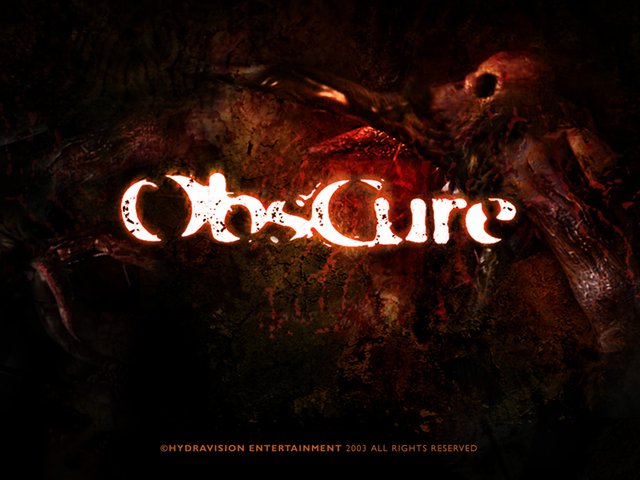
This also means Obscure isn't a very long game. My first playthrough took roughly six hours, but you can easily cut that in half or more once you know what you're doing. And honestly, I'd rather have a game that gave me a solid three hours of playtime with near-constant story advancements as opposed to one that offered ten hours when padded out with all the unnecessary grinding and hunting for keys.
As if all that wasn't enough, it's also loaded with replay value: beating the game on Easy or Normal unlocks both Hard and Special modes. Hard is just what it sounds like, while Special is sort of like the remix mode of the Resident Evil Director's Cut, which moves around items and adds some bonus stuff like new, more powerful weapons, into the mix. Additionally, every character who survives the game gets a secondary alternate costume unlocked for them. The alternate costumes aren't like the ones you'll find in, say, Haunting Ground -- they don't let your characters take more damage or do anything special -- but it's a nice bonus nonetheless. Finishing the game also unlocks a couple of behind-the-scenes videos showing Hydravision bringing the game to life.
Finally, the cherry on top of Obscure's sundae is the music. Composer Olivier Derivière's score is second-to-none in establishing the ideal atmosphere. Working with the Children’s Choir of the National Opera of Paris, he came up with a haunting, ethereal soundtrack that is just sinister enough to raise the hairs on the back of your neck when the soprano chorus expands to fill the space around you. Considering this was the first video game he ever scored, this makes the results that much more impressive. It led to an impressive career, scoring not just the sequel Obscure: The Aftermath, but also the incredible Remember Me, and even an entry in Ubisoft's perennial people stabber Assassin's Creed franchise. If you play the PS2 release, you also get a couple of licensed tracks from the bands Sum 41 and Span which do wonders to set the tone from the beginning, but for Xbox and PC players, these were replaced with more generic rock tracks.
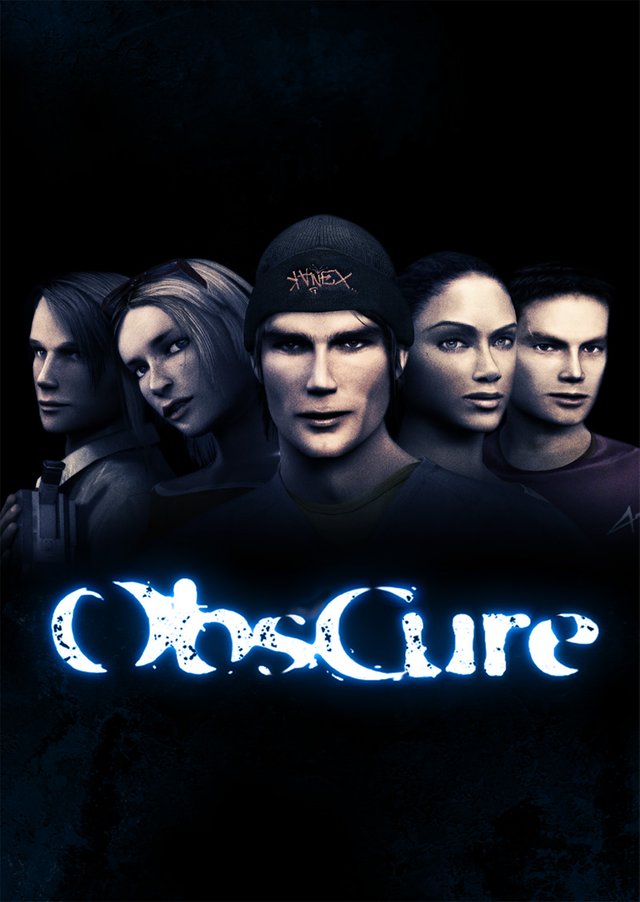
That isn't to say the game has no downsides: the English voice acting is only reasonably competent (the French dialog, by contrast, is much better), there's a very limited selection of creatures you face (and the most obnoxious/time-consuming boss monster gets recycled three times), and all the menu stuff that you would normally do while paused in other games is handled in real-time in Obscure (which makes healing yourself in the middle of a fight a little more realistically dicey).
But as long as you understand what you're getting (a freshman development effort, published as a budget title, which came out fifteen years ago), Obscure is definitely worth your time. The bad news is, the console editions as well as the physical disc edition of the PC version are long out of print, and can be pricey to obtain on the second-hand market. The good news is that digital editions of both this game and its sequel, Obscure: The Aftermath, were updated to work on newer systems and released on Steam back in 2014. You can get the original for only $6.99, or the pair as a bundle for $14.99, which is an absolute gem of a deal, and probably the easiest way to experience them today.
So grab a friend (better yet, grab four and have each of you pick a character to play so you can swap off over the course of an evening) and see if you can solve the mystery of Leafmore High before the sun comes up.
You're not scared, are you...?
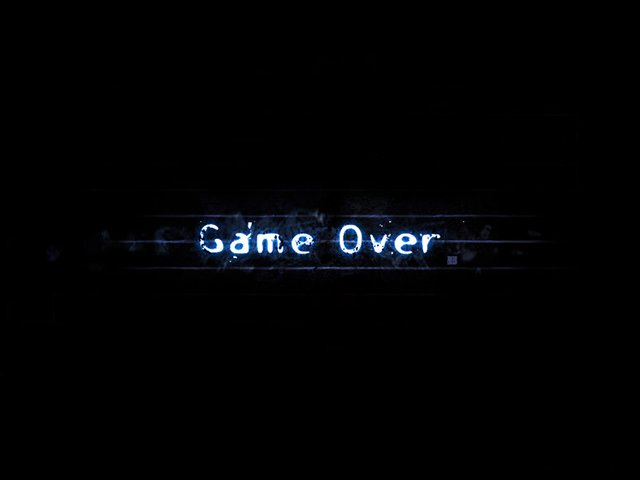
Had never heard of this, actually sounds pretty interesting. Really nice write up :)
@tipu curate
Downvoting a post can decrease pending rewards and make it less visible. Common reasons:
Submit
Upvoted 👌 (Mana: 20/30 - need recharge?)
Downvoting a post can decrease pending rewards and make it less visible. Common reasons:
Submit
Glad you enjoyed it, @carlgnash. I've written about this game before on other websites, and even briefly here a couple of years ago, but I go back and replay it every few years because it's just so damn fun. I have some other less-well-known PS2 games I'm thinking about doing write-ups for in the future, so keep your eyes peeled! :D
Downvoting a post can decrease pending rewards and make it less visible. Common reasons:
Submit
This post was shared in the Curation Collective Discord community for curators, and upvoted and resteemed by the @c-squared community account after manual review.
@c-squared runs a community witness. Please consider using one of your witness votes on us here
Downvoting a post can decrease pending rewards and make it less visible. Common reasons:
Submit